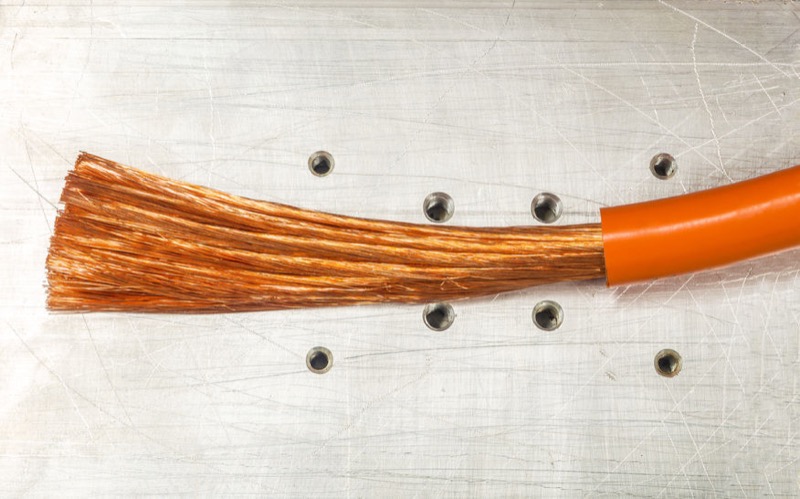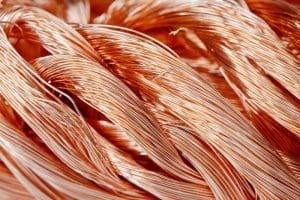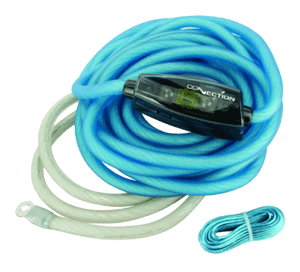 When it comes to high-current wiring in a vehicle, there are two types of stranded power wire available: solid copper and copper-clad aluminum. This article looks at the differences between each kind of wire, and explain the challenges of ensuring your high-current device gets the power it needs to do the job you want done.
When it comes to high-current wiring in a vehicle, there are two types of stranded power wire available: solid copper and copper-clad aluminum. This article looks at the differences between each kind of wire, and explain the challenges of ensuring your high-current device gets the power it needs to do the job you want done.
Car Audio Power Wire: Background
 In mobile applications, or anywhere that a conductor may be exposed to movement or vibration, it is recommended to use only stranded conductors. Solid conductors (like single-strand house wiring) may offer slightly more conductor area for a given wire diameter, but over time, the solid wire can work-harden, become brittle and eventually break from repeated back-and-forth motion. Imagine using large-gauge solid copper wires in the wire boot in a door jamb or to your trunk or hatch lid. That is a recipe for disaster.
In mobile applications, or anywhere that a conductor may be exposed to movement or vibration, it is recommended to use only stranded conductors. Solid conductors (like single-strand house wiring) may offer slightly more conductor area for a given wire diameter, but over time, the solid wire can work-harden, become brittle and eventually break from repeated back-and-forth motion. Imagine using large-gauge solid copper wires in the wire boot in a door jamb or to your trunk or hatch lid. That is a recipe for disaster.
The term OFC (oxygen-free copper) has become abused and is used synonymously with solid or all-copper conductors. In actuality, OFC is a type of solid copper. When molten copper is cast and drawn into a conductor, the process to make an OFC conductor reduces the oxygen content of the wire. If all is done perfectly, the copper-oxygen content is around 42 parts per million (PPM) vs. a conventional copper with content that is roughly six times that amount.
In the mobile electronics industry, there is no way to know if the solid copper conductor you are purchasing is oxygen-free or not unless you can witness the casting process in person. Everyone in the industry uses “OFC” for a piece of wire that is not copper-clad aluminum (CCA).
Looking at the alternative, we have CCA conductors. In these conductors, the core of the wire is a cylinder of aluminum and around it is a layer of copper. From the side, it looks like copper, but if you cut off a piece and look at the end, you can see the gray aluminum content.
There are further variations. Some companies manufacture all-copper strand wire but coat the outside of each strand with a thin layer of tin to help prevent corrosion.
Car Audio Power Wire: Size
When it comes to flowing electricity, or, more specifically, flowing electrons, the most important thing to consider is wire size. In the mobile electronics industry, we use the American Wire Gauge (AWG) standard. This sets a specific diameter for a conductor. It’s not a debatable number – the conductor either meets the standard or it doesn’t.
Here is where the games begin. There is a second term used in our industry: gauge. In the steel sheet industry, gauge is an important tool for specifying material thickness. In car audio, it means nothing. If you have been around the industry for any amount of time, you will have seen wires that claim to be 0 gauge but have a conductor area equivalent to a 6 AWG. If a wire is labeled as 4 gauge, then sadly, you have no way of knowing how big it is, other than attempting to measure it.
Cutting a wire and looking at the area also doesn’t always tell the story. Some wires are wound quite loosely. This makes the wire very flexible, but does so because there is space around the strands. You sacrifice effective cross-sectional conductor area for flexibility.
Car Audio Power Wire: Materials
 In solid copper stranded wire, we ideally want everything to be pure copper. That said, pure copper is quite expensive, even though the cost of pure copper has come down over the past few years; it currently sits at around $2.00–$2.25 a pound on the commodities market. When a manufacturer wants to purchase wire, there are many options: strand count, how the strands and bundles are woven, how tightly they are woven, and so on. Manufacturers also have a choice in the “kind” of copper they make the conductors with. It could be pure copper, recycled copper or a copper alloy. Again, you have no way of knowing unless you are witness to the process.
In solid copper stranded wire, we ideally want everything to be pure copper. That said, pure copper is quite expensive, even though the cost of pure copper has come down over the past few years; it currently sits at around $2.00–$2.25 a pound on the commodities market. When a manufacturer wants to purchase wire, there are many options: strand count, how the strands and bundles are woven, how tightly they are woven, and so on. Manufacturers also have a choice in the “kind” of copper they make the conductors with. It could be pure copper, recycled copper or a copper alloy. Again, you have no way of knowing unless you are witness to the process.
Don’t let the variations in copper scare you. A solid copper conductor always outperforms a CCA conductor. The biggest challenge with car audio CCA wiring is that it does not, and will not, specify the ratio of copper to aluminum. There are publically displayed measurements of different CCA wire samples where a smaller-diameter wire outperforms a slightly larger wire because it has less aluminum and more copper. Unless you measure it yourself, you just don’t know.
On its own, pound for pound, aluminum has about 60% more resistance to the flow of electricity. When we talk about CCA wire, there is some copper in there; in most cases, the difference diminishes to 30 to 40%.
Car Audio Power Wire: The Challenge

When you look at car audio wiring, there is no way to know what you are getting with a CCA amp kit or roll of wire. Some manufacturers make CCA wire that functions nearly as well as solid copper. In fact, one company makes an oversized CCA that has less resistance per foot than solid copper. The downside is that the wire doesn’t fit into a lot of connectors or terminal blocks. Overall, unless you want to take the time to measure the properties of the kit you are buying, it is better to stick to solid copper.
From the standpoint of long-term benefits, solid copper wire resists corrosion much better than CCA wiring. In climates where road salt or brine is used in the winter to keep surfaces clear of ice, we have seen instances where unprotected CCA power wires have failed completely in less than two years. Why risk the performance of your audio system, when you can simply choose the solid copper wire?
How do you know if you are getting something good? The Consumer Technology Association (formerly the Consumer Electronics Association) has developed a standard for wiring. It is called CTA-2015 (formerly CEA-2015) specification. It describes the minimum standards for wiring for use in mobile electronics applications. The standards include that the wire must be stranded solid copper, the minimum number of strands for a given AWG wire size, and the area of the wire and its maximum resistance. If you stick to the brands that support the CTA-2015 standard, you should never have any problems.
This article is written and produced by the team at www.BestCarAudio.com. Reproduction or use of any kind is prohibited without the express written permission of 1sixty8 media.